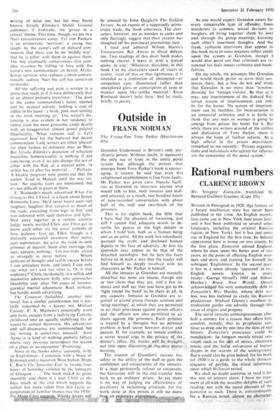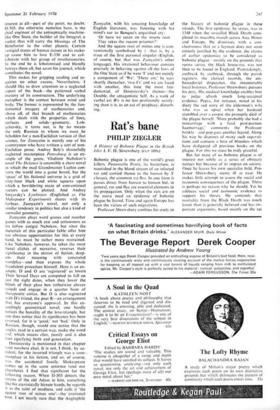Rational numbers
CLARENCE BROWN
We Yevgeny Zamyatin translated by Bernard Guilbert Guerney (Cape 35s)
Written in Petrograd in 1920. this fantasy of a future totalitarian state has never been published in the USSR. An English transla- tion came out in New York four years later. and it has been published in several other languages, including the original Russian (again, in New York), but it has just.comc out in England for the first time. Its belated appearance here is ironic on two counts. In the first place. Zamyatin adored England, where he once spent the better part of two years, to the point of affecting English man- ners and dress and earning for himself the sobriquet 'Englishman'. In the second pace, it has in a sense already 'appeared' in two English novels known to every reader—George Orwell's 1984 and Aldous Huxley's Brave New World. Orwell acknowledged his very considerable debt to Zamyatin's We; Huxley, whose debt was less, was less inclined to credit his Russian predecessor. Michael Glenny's excellent in- troduction guides one adroitly through this maze of origins and progeny.
The novel remains contemporaneous after half a century for a reason that offers little comfort, namely, that its prophecies con- tinue to drop one by one into the slots of real history. Zamyatin's prescience could be nonchalant: he forefaw merely trivial vex- ations such as the obit of unisex, electronic music, and the ballet inecanique of human shapes in the warren of the underground. But it could also be grim indeed, for his book (of 1920!) is a guide to the whole intricate etiquette of perfidy, the ritual informing. upon which Stalinism rested.
We shall no doubt continue to read it for this sort of interest alone. I have no argu- ment at all with the macabre delights of such reading. nor with the equal pleasure of the narrative as such. There is, extraordinarily for a Russian novel, almost no character- interest at all—part of the point, no doubt. D-503, the otherwise nameless hero, is the chief engineer of the antiseptically machine- like One State, the builder of the Integral, a rocket that will carry the blessings of The Benefactor to the other planets. Certain vestigial traces of human nature in his make- up cause him to love E-330 and to col- laborate with her group of revolutionaries. In the end he is lobotomised and blandly betrays them all, but saves his journal, which constitutes the novel.
This makes for gripping reading and re- quiries no other excuse. Nevertheless, I should like to draw attention to a neglected aspect of the, book—the patterned verbal mastery of its construction. The underlying metaphor is the contest between mind and body. The former is represented by the fun- damental imagery of mathematics and, above all, of that branch of mathematics which deals with the properties of lines, surfaces and solids—geometry. Lob- achevsky, it turns out, is by no means the only Russian to whom we must.,,be beholden for a non-Euclidian version of that science, for Zamyatin is merely one of his countrymen who have written a sort of non- Euclidian prose. Andrey Bely's shamefully neglected masterpiece Petersburg is an ex- ample of the genre. Vladimir Nabokov's novel The Defence is ostensibly a chess novel in which the mad Grandmaster Luzhin con- verts the world into a game board, but the 'space' of his fictional universe is a grid of sixty-four black and white squares upon which a bewildering maze of conventional vectors can be plotted. And Andrey Sinyaysky's Lyubittiov (Englished as The Makepeace Experiment) shares with its forbear, Zamyatin's novel, not only a similar tendency in politics but also a kind of surrealist geometry.
Zamyatin plays word games and number games with as much zest and seriousness as his fellow ernigr6 Nabokov, but since the materials of this particular fable offer him too obvious opportunities for this at every hand, he must be rather more restrained. Like Nabokov, however, he takes the most banal clichés of narrative, reverses their significance in the mirror of fiction, deep- ens their meaning with concealed wordplay—and then exposes the whole fraudulent procedure himself. Here is an ex- ample. D and 0 are 'registered' as lovers Their Sexual Days are computed to fall on just the right dates, when they lower the blinds of their glass box (otherwise always raised) and engage in a quarter hour of therapeutic coitus. But 0 is also registered with D's friend, the poet R—an arrangement that has everyone's approval. In this ex- ceedingly geometrical novel, one hardly notices the banality of the love-triangle, but one does notice that its significance has been reversed, for it is 'good,' not 'bad.' Only in Russian, though, would one notice that the angles, read in a certain way, make the word rod, which means clan, family and is also root signifying birth and generation.
Dostoievsky is mentioned in that chapter (and nowhere else). It is not, I think, by ac- cident, for the inverted triangle was a 'com- monplace in his fiction, and so, of course, Was the accidental family. Shakespeare comes up in the same sentence (and not elsewhere). I find that significant for the following reason. When D-503 detects the strains of the old Adam in him, something like his atavistically hirsute hands, he regards it as the taint of madness, and calls it 'the square root of minus one'—the irrational root. I am nearly sure that the Anglophile
Zamyatin, with his amazing knowledge of English literature, was listening with his mind's ear to Banquo's anguished cry: 'Or have we eaten on the insane root That takes the reason prisoner?'
And the square root of minus one is con- ventionally symbolised by i—that is, by a trace of the first personal singular (English, of course, but that was Zamyatin's other language). His irrational behaviour consists precisely in behaving against all the laws of the One State as if he were 'I' and not merely a component of 'We'. 'There are,' he says shortly thereafter, 'two l's' and we are faced with another, this time the most fun- damental, of Dostoievsky's themes—the Double, the antagonistic Self. As a work of verbal art We is no less profoundly satisfy- ing than it is, as an act of prophecy, disturb- ing.



































 Previous page
Previous page